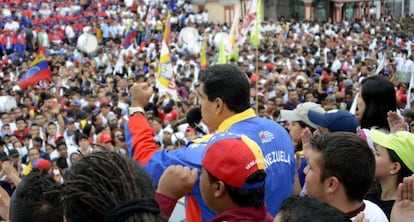Maduro passes two decrees to increase control over economy
Venezuelan president makes first use of new special powers

Just as he said he would, Venezuelan President Nicolás Maduro on Thursday night enacted his first two decrees resulting from the special powers granted to him 48 hours earlier by the National Assembly.
Both laws seek to give the state complete control over the economy, replacing some bodies while turning others into mere tools.
The Organic Law on Costs, Earnings and Fair Prices and the bill creating national foreign trade centers were signed into law at a public event held in a working-class neighborhood of Maracaibo, on the northwestern coast of the country.
Maduro - who took office in April of this year after a controversial election that he won by a narrow margin of 1.5 percent, prompting the opposition to demand a recount - told his audience that the only goal of these laws would be to “protect the economic freedom and socioeconomic rights of the working people,” not those of all citizens.
He also took the opportunity to insult opposition leaders, asking the crowd to name the “male parasite” (Henrique Capriles of Justice First), the “female parasite” (independent María Corina Machado) and the “junkie” (Leopoldo López of Voluntad Popular). He often refers to these three as “the trilogy of evil.”
Before that, Hugo Chávez's designated successor met student delegations at the Miraflores presidential palace in Caracas, where he offered a free tablet computer to every youngster in the country and 10,000 grants for university studies abroad next year.
Tu suscripción se está usando en otro dispositivo
¿Quieres añadir otro usuario a tu suscripción?
Si continúas leyendo en este dispositivo, no se podrá leer en el otro.
FlechaTu suscripción se está usando en otro dispositivo y solo puedes acceder a EL PAÍS desde un dispositivo a la vez.
Si quieres compartir tu cuenta, cambia tu suscripción a la modalidad Premium, así podrás añadir otro usuario. Cada uno accederá con su propia cuenta de email, lo que os permitirá personalizar vuestra experiencia en EL PAÍS.
¿Tienes una suscripción de empresa? Accede aquí para contratar más cuentas.
En el caso de no saber quién está usando tu cuenta, te recomendamos cambiar tu contraseña aquí.
Si decides continuar compartiendo tu cuenta, este mensaje se mostrará en tu dispositivo y en el de la otra persona que está usando tu cuenta de forma indefinida, afectando a tu experiencia de lectura. Puedes consultar aquí los términos y condiciones de la suscripción digital.








































